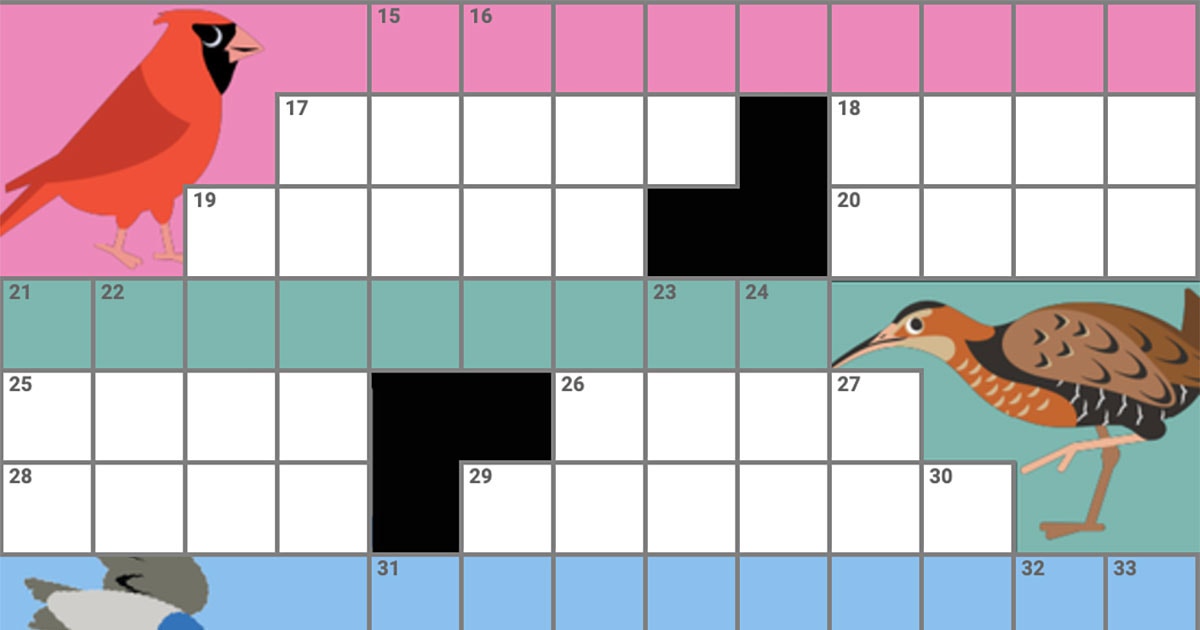One of the things you learn as a crossword constructor is that there’s no real limit to how cool or quirky a puzzle can get—just as long as you can actually pull it off. So when we elected to throw a bird-nerdy crossword into this winter’s issue of the magazine, I jumped at the chance to push the boundaries of a typical grid. The result is a fun chance to combine some avian ID savvy with the wordplay chops you’d usually expect a crossword to test. (One tip to get you started: The title, Waiting in the Wings, might be a useful hint about where you should look to find a complete solution.)
As my colleague in puzzling Matthew Stock reflects in his essay below the grid, solving crosswords and birding are both about getting comfortable living amid the unknown. So whether this is your first puzzle or your thousandth, if you’re on this page, you’re already in the right place to stretch yourself and learn something new. Enjoy! —Jasper Davidoff
Waiting in the Wings
Illustrations by Emily Renaud.
To check your work, view the full answer key here.
Take It From Me: See Birding As a Puzzle
During one of my first outings with the Alachua Audubon Society in Gainesville, Florida, the group and I paused to watch a flock of vultures circling high over our heads. Some of them, a group leader explained, were Turkey Vultures, and some were Black Vultures. I trained my binoculars to the sky—first in excitement, then in defeat. Even as the leader patiently explained these birds’ differences, I struggled to tell them apart. How were these subtle distinctions in head shape, wing angle, and flapping frequency immediately so clear for others? Would I ever be able to figure this out for myself?
These feelings and questions were familiar to me. Several years earlier, I took my first dive into the world of solving crossword puzzles. I had always loved language and patterns, and I figured I’d pick it up without too much sweat. Sure enough, I broke into easy puzzles quickly. But as I waded into more challenging crosswords, I hit dead end after dead end. Bewildered by tricky wordplay, I fumbled over references to 19th-century philosophers, plant genera, and classic television. How was I supposed to know these things?
I was still captivated by the prospect of filling in every last square in a grid, so I decided to keep going, chipping away at hard puzzles and improving bit by bit over time. The first New York Times Saturday crossword that I finished took me the better part of a day. Nowadays, I can solve the toughest puzzle of the week in five to nine minutes. And now that I’ve started constructing crosswords of my own, I have even had many puzzles published in the Times and other newspapers over the past five years.
Since first being bamboozled by those vultures two years ago, I’ve found joy in my bird outings by relying on the same persistence and determined detective work that I use for crosswords. Practice is an integral part of both processes. The more puzzles I’ve solved, the quicker I’ve gotten at recognizing common entries and using letter patterns to decipher longer, trickier answers. Similarly, as I’ve spent more time with my binoculars at the ready and my ears alert for calls, I’ve become more confident in spotting familiar species and knowing what to look for when unusual birds cross my path. In birding and in puzzle solving, I’ve learned to take my time and carve out undistracted, unplugged space to cherish the task in front of me. And when things get hard, I turn to my fellow enthusiasts for encouragement and support. I’ve never met a veteran birder or a seasoned crossword buff who wasn’t delighted by the chance to share what they knew with others.
So on your next walk or ramble, instead of seeing a tricky bird ID as a problem, try seeing it as a puzzle. And if you happen to find a five-letter feathered friend in your crossword, it’s probably an egret. —Matthew Stock
This piece originally ran in the Winter 2024 issue. To receive our print magazine, become a member by making a donation today.

